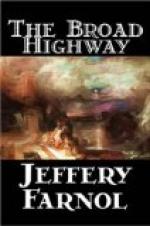“Supposin’ I was to thump ’ee on the nose?” he inquired.
“What for?”
“For makin’ so free wi’ my hay.”
“Why then,” said I, “I should earnestly endeavor to thump you on yours.”
The farmer looked me slowly over from head to foot, with a dawning surprise.
“Thought you was a common tramper, I did,” said he.
“Why, so I am,” I answered, brushing the clinging hay from me.
“Trampers o’ the road don’t wear gentlemen’s clothes—leastways, I never see one as did.” Here his eyes wandered over me again, from my boots upward. Half-way up, they stopped, evidently arrested by my waistcoat, a flowered satin of the very latest cut, for which I had paid forty shillings in the Haymarket, scarcely a week before; and, as I looked down at it, I would joyfully have given it, and every waistcoat that was ever cut, to have had that forty shillings safe back in my pocket again.
“That be a mighty fine weskit, sir!”
“Do you think so?” said I.
“Ah, that I do—w’at might be the cost of a weskit the like o’ that, now?”
“I paid forty shillings for it, in the Haymarket, in London, scarcely a week ago,” I answered. The fellow very slowly closed one eye at the same time striking his nose three successive raps with his forefinger:
“Gammon!” said he.
“None the less, it’s true,” said I.
“Any man as would give forty shillin’ for a garment as is no mortal good agen the cold—not reachin’ fur enough, even if it do be silk, an’ all worked wi’ little flowers—is a dommed fool!—”
“Assuredly!” said I, with a nod.
“Howsomever,” he continued, “it’s a handsome weskit, there’s no denyin’, an’ well worth a woman’s lookin’ at—a proper man inside of it.”
“Not a doubt of it,” said I.
“I mean,” said he, scratching his ear, and staring hard at the handle of the pitchfork, “a chap wi’ a fine pair o’ whiskers, say.”
“Hum!” said I.
“Now, woman,” he went on, shifting his gaze to the top button of his left gaiter, “woman is uncommon fond o’ a good pair o’ whiskers—leastways, so I’ve heerd.”
“Indeed,” said I, “few women can look upon such things unmoved, I believe, and nothing can set off a pair of fine, black whiskers better than a flowered satin waistcoat.”
“That’s so!” nodded the farmer.
“But, unfortunately,” said I, passing my hand over my smooth lips and chin, “I have no whiskers.”
“No,” returned the farmer, with a thoughtful shake of the head, “leastways, none as I can observe.”
“Now, you have,” said I.
“So they do tell me,” he answered modestly.
“And the natural inference is that you ought to have a flowered waistcoat to go with them.”
“Why, that’s true, to be sure!” he nodded.
“The price of this one is—fifteen shillings,” said I.
“That’s a lot o’ money, master,” said he, shaking his head.




